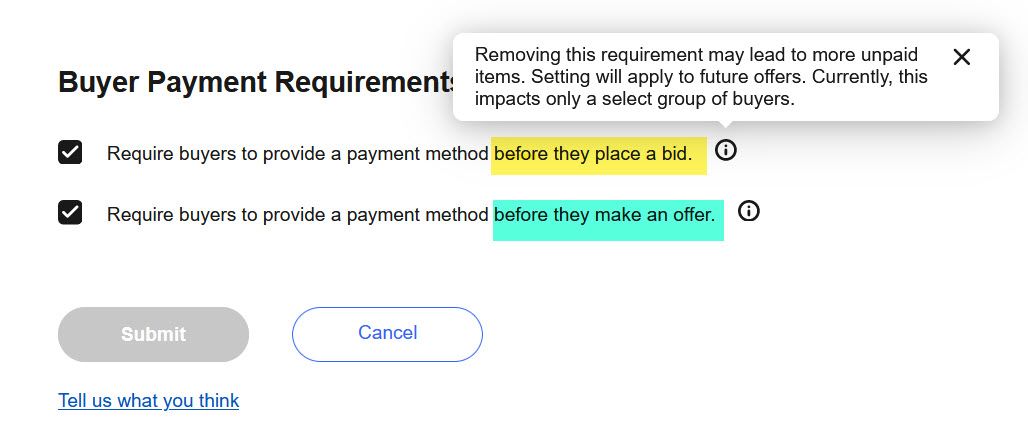eBay Removes, Then Re-enables Payment Method Required To Bid On Auctions
UPDATE 6-10-24
eBay has now re-enabled the "require buyers to provide a payment method before they place a bid" for auctions in seller settings under Buyer Requirements.

Sellers should check their settings as some report being automatically opted in by eBay even if they previously had previously opted out.

I just wanted to try and get the word out since eBay hasn't announced this.
Check your account settings everyone to make sure the buyer requirements are what you prefer. eBay just added back the option to require payment method before bidding on Auctions.
Some sellers have had these boxes CHECKED by eBay, even though they previously have not required the payment method. I prefer not to require since I have no issues with unpaids and want to combine shipping.
The setting can be accessed in the Buyer Requirements section of Seller Hub. https://www.ebay.com/bmgt/buyerrequirements
eBay's efforts to end unpaid items on the platform have taken one step forward and two steps back as this week's Winter Seller Update finally provided details on changes to immediate payment for seller initiated offers, but previously available settings to require immediate payment for auctions have been quietly removed.
eBay began testing immediate payment for auctions in July 2023, alarming sellers by automatically opting them in without notice or explicit consent.

The setting to "require buyers to provide a payment method before they place a bid" resided under Buyer Payment Requirements and sellers were warned it would only impact a select group of buyers (those who were in the test) if they left it enabled.

Many buyers balked at being required to provide payment information upfront with complaints that it prevents them from using certain payment methods or purchasing multiple items from the same seller and requesting combined shipping.
The immediate payment required implementation also caused problems with eBay's Vault service for trading cards, preventing buyers from choosing to have cards won at auction sent to the vault.

eBay appeared to be attempting to address these issues with changes buyers and sellers observed in December that essentially put a timer on the transaction for auctions.
Instead of immediately charging the payment method on file when the auction ended, the order showed a 3 day countdown to when the payment would be processed, allowing time to change the shipping address or request combined shipping.
Buyers who saw that test reported a pop up when bidding that said:
Introducing payment preferencesYou'll confirm your payment method and shipping address
You can make changes before each auction ends.If you win, we'll automatically process your order after 3 days
You can checkout sooner or use the time to request combined shipping, if applicable.
Introducing Automatic Checkout
To protect our marketplace, we're making sure no item gets left unpaid.
Here's how:Before you bid, set your payment preferences (you can update these before the auction ends.)If you win, we'll automatically process your order
When confirming the buyer's bid, eBay showed this message:
You're now the highest bidder! If you win, we'll automatically process your order on [Date] at [Time]. If purchasing multiple items, you can contact the seller before then to request combined shipping.
When an auction in this test ended, the winning buyer was sent a notification and the item was added to their cart with an option to request to combine shipping, as well as a note with a countdown showing "order will process automatically in x days, x hours, x minutes."
On the seller side, it appeared in Seller Hub with a countdown showing when the Autopay would be processed and an option to send an invoice if the seller wanted to combine shipping.
It's not clear if that test is still ongoing, but it is clear that eBay has quietly removed the option to require immediate payment for auctions in the Buyer Payment Requirement settings - "require buyers to provide a payment method before they place a bid" is no longer displayed.

Do this mean eBay is no longer requiring buyers to have a payment method on file before bidding on auctions or has eBay simply made that setting universal for all sellers and removed the option to opt out?
Sellers have been trying to get answers from eBay in the community forum discussion dedicated to the changes announced in the Winter Update, but so far eBay staff have declined to address any of those questions or concerns.
Senior Director Trust, David Newman, admitted at eBay Open 2023 that solving the problem of unpaid items on the platform was taken longer than originally anticipated and "unwinding 28 years of buyer behavior in a way that is net positive to your business requires a great deal of testing."
Unfortunately, eBay's severely lacking communication with buyers and sellers often turns that testing into a nightmare for both sides, as new experiences suddenly appear without notice or explanation and then just as suddenly disappear, leaving users baffled and searching for answers.
Perhaps it's time to reconsider if unpaid items are really such an urgent issue and if so, is the way eBay has gone about trying to solve the problem really in the best interest of users?
Sellers have complained about unpaid items for years but many are also now expressing frustration with the way eBay has implemented these changes, expressing concerns that they may be adding unnecessary friction, chasing buyers away and costing them sales.
Some have even started to wonder why eBay doesn't just put things back to the way they were until they can come up with a solution that will actually solve the problem without creating undue hardship for legitimate buyers.
The answer to that question may lie in eBay's financial reporting as a publicly traded company.
For much of its existence, eBay's quarterly and yearly reports defined Gross Market Value (GMV) as "Total value of all successfully closed transactions between users on our Marketplace during the period regardless of whether the buyer and seller actually consummated the transaction."
Consummated in this context just means paid - once an auction or buy it now listing resulted in a "commitment to buy", it was considered closed and counted as GMV, regardless of whether it was ever paid for or not.
At the end of 2021, eBay changed the definition of GMV to "the total value of all paid transactions between users on our platforms during the applicable period inclusive of shipping fees and taxes" and restated GMV and active buyer stats going back to 2018 using the new definition.
Investors carefully watch GMV trends as one of several measures for how a company is performing, so the fact that only paid transactions are now included could be a significant catalyst behind the push to "solve unpaid items on the platform."
If that is the case, we can expect to see eBay continue to blunder through tests trying to find a solution that balances their need to require payment for GMV-boosting purposes with other user experience considerations, all while alienating countless buyers and sellers due to lack of communication and poor execution.
What do you think of eBay's efforts to "end unpaid items on the platform?" What are they getting right and what would you like to see them do differently? Let us know in the comments below!
















